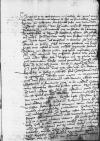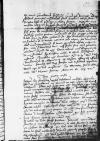Letter #349
Cornelis DE SCHEPPER to Ioannes DANTISCUSMonaco, 1527-06-03
English register:
The departure from the port of Palamos was postponed to the next day, due to the arrival of a messenger. On the 28th of May they left at sunset in a brigantine (myoparo), trying in vain to reach the carrack that was anchored off the coast. At dawn they had to return to the harbour. After breakfast they succeeded in finding the great ship, and immediately set sail. Throughout the journey, which took 15 days, there was a moderate breeze and a calm sea. On the 1st of June, when they had sailed almost past the French Mediterranean coast, they decided to move to the two brigantines, leaving their luggage and their servants in the carrack, under protection of the galleon, and to make for Monaco. The rest of the Ligurian coast is not safe since the French took possession of Savona. Their navy infests that part of the Mediterranean Sea.
On the 1st of June the French ships that were chasing Moorish pirates detoured from their route to intercept three Genovese ships that were anchored in the port of Monaco. After the artillery of the fortress of Monaco killed a number of French marines, and sank one of their galleons, they sailed to Ventimiglia, and from there to Corsica or Savona.
The day before De Schepper's arrival in Monaco, a brigantine left from there carrying the news of the capture of Rome and the imprisonment of the Pope [Clement VII]. One can hardly rejoice about this victory, because of the loss of the commander [Charles de Bourbon]. It will be almost impossible to replace him as commander in chief of the imperial armies. Hence, De Schepper shares Dantiscus' concerns.
The Chancellor [Mercurino Gattinara] is in exceptionally good shape. De Schepper does not know the Chancellor's next destination yet, but he supposes it will be Vercelli or Genova. He could not speak to him, because the Chancellor was too occupied with his correspondence. The Chancellor is expecting instructions from the Emperor [Charles V]. There are rumours that the Pope will be transferred to Spain via Naples or Caieta. De Schepper is tired of his current inactivity. It is hard to bear the jealousy of the Chancellor's entourage, being alone and without his trusted friend. He will not abandon the Chancellor.
He cannot write about confidential matters, because his codebook is still in his trunk on the carrack. They intend to send smaller ships to collect the luggage and the servants that were left on the carrack at sea.
He complains about people in Spain who scoff at him, and blame him for the Chancellor's departure from court, while they themselves have abused his benevolence. Dantiscus knows the true facts: the Chancellor had planned this already three years ago, without any advice from De Schepper. In their letters, his detractors even suggest that the Emperor is displeased with him, which is obviously a mendacious allegation.
De Schepper wants to inform Dantiscus about this, so he knows how to respond. He asks for news about the King of Denmark [Christian II of Oldenburg]. He will keep Dantiscus informed of their experiences. He recommends himself to mutual acquaintances and sends his regards to Dantiscus' family.
The letter is dated the 3rd of June. In a postscript dated 7th June De Schepper explains that he intended to send his letter with a messenger who was retained by the Chancellor. Two days later the brigantine that was carrying the message about the capture of Rome returned to the port of Monaco, after being attacked by Moorish pirates. The messengers on this boat, Jean Durand, secretary to the viceroy of Naples [Charles de Lannoy], and the envoy of the Emperor to Genova, will carry De Schepper's letter to Dantiscus. He compares the great danger that these men have experienced with the prosperous journey of the Chancellor's company.
| received Valladolid, [1527]-06-24 Manuscript sources:
Auxiliary sources:
Prints:
| ||||||||||||
Text & apparatus & commentary Plain text Text & commentary Text & apparatus
Clarissimo domino
Salutem.
cf.
Et vide, per Christum, quam id bene ceciderit nobis! Pridie enim Kalendas Iunias, hoc est die Sabbato, septem biremes
Pridie quam huc appullissemus, obscura iam nocte hinc solverat bergantinus ille, qui nuntium fert de capta urbe
Enimvero illustris dominus
Aiunt
Homines aliquot inepte lepidi apud vos iocis scommatisque adversum me agunt, quos ne litteris quidem inserere verentur, ridiculi sane futuri, si me aequum pugilem, et quales ipsi sunt, invenirent. Omnis culpa est mea, quod abierit
ex curia
Si quid de
Ex
Tuus, quem nosti,
Postscript:
Postquam has scripsissem ratus tabellarium confestim abiturum, illustris dominus
Iterum vale.
VII-o Iunii.
[1 ] Celtiberis: Celtiberia is the ancient denomination of the region in North-Central Spain inhabited by the Celtiberi tribes. It is situated in the hill country between the Tajo and Ebro rivers, a territory corresponding roughly to the Spanish provinces of Soria, Guadalajara and Teruel. Here the name is used in a broader sense, including the coastal region of North-Eastern Spain
[2 ] Rome was taken on 6 May 1527 by the Spanish and German troops of Emperor Charles V. There followed the plundering of the city by the mutinous troops, known as the "Sacco di Roma"



